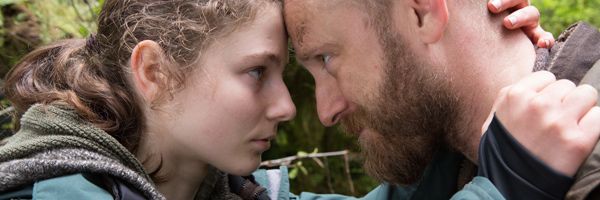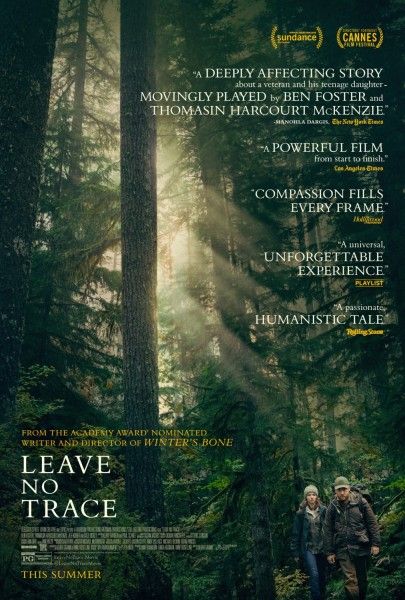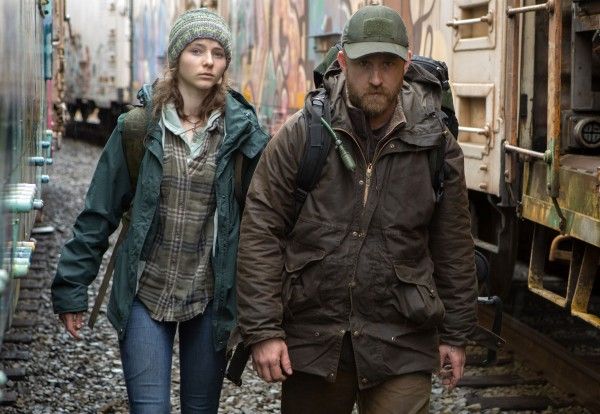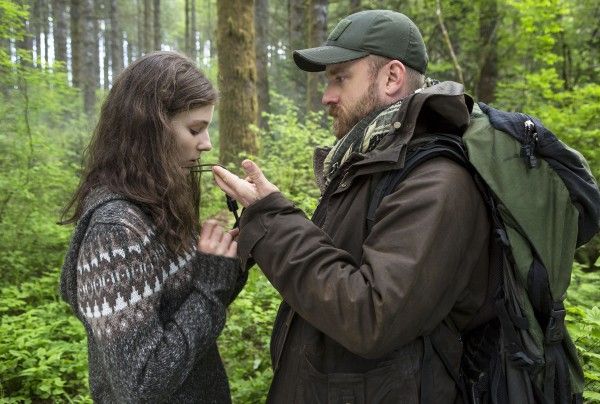From filmmaker Debra Granik (Winter’s Bone), the indie drama Leave No Trace follows a teenage girl named Tom (Thomasin McKenzie) and her veteran father Will (Ben Foster), who have lived undetected for years in the vast woods of Portland, Oregon. When Tom is spotted, it leads to their removal from Forest Park and forces them to try to adapt to new surroundings in the wilderness, which puts them on opposing sides in their desire to be a part of a community.
During this 1-on-1 phone interview with Collider, actor Ben Foster (who gives a truly terrific and memorable performance in the film) talked about what drew him to Leave No Trace, what he learned to better understand this character, wanting to unplug and appreciate a simple existence, finding your own balance in life, the experience he had working with Thomasin McKenzie, and the uncertainty of being a parent. He also talked about making Galveston (about a dying hitman who returns to his hometown to carry out his revenge) with Elle Fanning, and his desire to get behind the camera, as a storyteller.
Collider: I thought you did really, really tremendous work in this film. I was just so moved and touched by this story, especially by the father-daughter relationship..
BEN FOSTER: Thank you. I’m so glad to hear that.
How did you come to be a part of this film? Was it just a script that you got and read, or did the director reach out to you about it?
FOSTER: The script was circulating town. A much more famous actor than I had already been attached to the job, and then had to pull out. My rep said, “You should read this quickly,” and I did. It’s rare for me to have such an emotional response. It had come on the heels of just finding out that my wife was pregnant, and with a girl, so it felt beautifully timed. I pursued it rigorously and stated my case for why I wanted to do it so very much.
What was it about this story, in particular, that most struck you and made you want to tell it?
FOSTER: When we found out that we were going to have a child of our own, there was the first blush of excitement, and then the scary questions started to bubble to the surface. This film is as much about saying goodbye to your child or to a parent, and how do you do that lovingly? As all these ideas and thoughts and questions started showing up at home, I was thinking back to my parents and how I didn’t thank them enough. I didn’t appreciate what they had done and what they had sacrificed, and I didn’t recognize how difficult it might have been or how frightening it might have been, to be raising someone in this world. So, getting the opportunity to jump forward, in my own imagination and in my own mind, of loving someone so much. How do you let someone go, if that’s the best thing for them? At the same time, we were anticipating the entrance of and the arrival of our daughter. It was a beautiful find.
When you read a script, what is it that you look for, in the story and character? Is it about having some kind of emotional connection to the material?
FOSTER: It depends on the time. There are those moments in your life where maybe we put meaning where there isn’t, or maybe we’re picking up on signals in the universe. You know how it is, when you fall in love and a song comes on the radio that feels like it was written just for you, or you’ve gone through a difficult time and that song that sings about suffering speaks to you. A script can be like that song and meet you wherever you’re at. It may not be comfortable, but it stimulates, provokes, charges and challenges, and you can’t get it out of your head. In my experience, the best way to get a song out of my head, is to listen to it about a thousand times, and I suppose that’s what making a movie is like. There isn’t a particular door in. It’s a feeling.
You’ve said that you like to learn as much as you can for each role that you do, so what did you learn for this role, in particular, and how did that help you understand who this guy is?
FOSTER: It was training with Dr. Nicole Apelian, who runs a fantastic school outside of Portland, Oregon, and Alan Kay, who handled some of the military training, which was different than some of the things I’ve done in the past. We gained wilderness appreciation and survival techniques, and learned the basic fundamentals of water catchment. How do you gather water when you don’t have your bottled water from the grocery store? How do get what you need to drink water? How do you find food? If you don’t have a shelter, how do you create one? You have to learn how to identify your resources, and then how you can most efficiently use your energy and time? You’re fighting to create something that gets you to the next point. That training informed us, throughout working on the script with (writer/director) Debra [Granik], until the last days of shooting. On the military side of things was the physical behavior. I was interested in what a man does, who has served and struggled with re-entry. How does he use the tools that he learned in the military, in a peaceful way? One of those concepts was something called gray man. The gray man technique is how to disappear in public, or more importantly, how to disappear in plain sight. So, there was a physical awareness and behavior that I was keen to explore against the push-pull trauma of war. If someone who can expand and breathe with big lungs in the forest, and who has certain skills to operate in that environment, when you take that away, what happens to the operator? What happens when you take his band-aids for trauma away?
We really should remember that everybody has a story.
FOSTER: Man, that should be the reminder, every day. It would be a much happier, peaceful, kind universe.
When you have to go through all that training and learn what it takes to survive out in the wilderness, does it make you feel like you are somebody who would be able to just unplug from everything electronic, or does it reinforce how you probably would not be able to do that?
FOSTER: It reinforced an appreciation. I wouldn’t say that it made me question, if I could. It makes me question, what are the choices that I made in this life, and how did I make them? What’s so wonderful about Will is that he has attempted to find peace in a world that he finds intensely disruptive to his mental well being. There is so much junk food in our lives, myself certainly included, that can clog your appreciation of a simple experience, so I really appreciate his decision. It makes me think more about, how am I going about my daily existence? And more importantly, how am I going to talk about these things with our daughter, as she gets older? Where’s the elasticity there? How can we grow and still maintain some sense of a self, in a place that is, for all intents and purposes, telling us to become our iPhone?
Do you try to make a point of putting down your phone, at least every once in awhile?
FOSTER: It’s a vicious cycle and it’s addictive. That has been well-proven, in the way that it’s affecting our dopamine receptors. It’s changing the very landscape of our mind, these devices and our dependence on them. It’s creating a nervous system on high alert. It’s no different than being someone who’s living off the land and listening to the bird calls for their warnings. Is there a wolf coming? Is there an enemy coming? Is there a friend coming? There are ways to read nature that have been somewhat lost. The cell phone itself is, in many ways, the non-stop chattering of the birds, and it’s just noise pollution. It’s thought pollution. The ability to communicate is not the problem. It’s that we are so dependent on it that we’re losing natural skills, and in that disconnect, we’re becoming not only less connected, but more anxious and depressed. The numbers are unavoidable. So, what I’m seeking, rather than an extreme move, is how to at least ask the question and what to practice. The balance in one’s life has to be individual. For me, it’s just going to touch nature, once a day. Go look at a tree. Go take a walk. Go look at the sky and take a breath. I know that my day is a little bit better because of it. For others, it might be something else.
This guy is the father of a teenage daughter, and that relationship is so important to the emotional core of the story. What as Thomasin McKenzie like to work with and to develop that bond with, and how do you feel that she really deepened your performance?
FOSTER: There are those people where, when you walk down the street and you see someone and just get a sense of, “I bet we could be friends,” and the person goes along and you never see them again. You just get a feeling. I felt that way about Tom, and had the good fortune of getting to play with her in the woods. She’s a very special human, and her parents did a mighty fine job. She’s her own individual. She comes prepared and can improvise. She likes to collaborate. She isn’t needy. She’s self-sufficient. She’s everything you could want in a fellow builder. She’s great.
Do you see this guy as a good father, or do you see him as somebody who maybe needed a little bit of help with being a father and didn’t necessarily always know the right thing to do?
FOSTER: If you can find me a father that knows the right thing to do all the time, I need to talk to him, desperately. I really need some advice. My job is to defend the people that I play. I agree with some of his philosophies and I really appreciate his rigorous line of questioning. For myself, it’s not the way that I would choose to balance my relationship with society and nature.
It’s so interesting to watch this man because it really shines a light on the fact that it’s so hard to know how to be a father to somebody when you don’t necessarily know how to take care of yourself, or what’s best for yourself, so how do you then transfer that to another person?
FOSTER: As people, we hopefully do the best that we can. We fuck up, and wish we could take things back. That’s not just being a parent, that’s being a human being who loves somebody else, and that could be a partner, a sibling, or a friend. It’s so hard, at times, to know what the right thing to do is. When you’re fed, when you’re rested and when you’re watered, you take a breath and better decisions tends to arise then out of panic, but we can’t always afford that luxury. It’s confusing being a person, sometimes.
You also have Galveston coming out. What was that like to shoot, and what drew you to that character and story?
FOSTER: I had seen Mélanie Laurent’s film Breathe, which was spectacular. It’s one of the most effective films about adolescence. I have not had the experience of being an adolescent girl, but in my estimate, it was a very deep dive and an effective one. I was terribly moved by what she did with that, so that drew me to it. And then, I think Elle [Fanning] is such an exciting actor, and she’s got a great reputation for just being a pro. That makes a big difference. It really does. If you’re a good actor, with a bad rep, that just makes it harder. When you have a great actor, who’s got a great rep, then you want to go play with that person. When the cameras roll, she has the most devastating truth pouring out of her eyes, and I just find myself distracted, at times, watching how fantastic she is.
We hear all of this talk about how male-dominated this industry is, especially behind the camera, and yet you’re working with some very talented female directors and you have a lot of female co-stars. Is that something you’d ever taken note of, before there was a spotlight on that?
FOSTER: Oh, sure, yeah! Absolutely! But, I’ve been really fortunate. Even when I was doing Six Feet Under, Alan Ball made sure that a lot of his writers and directors were women. So, I’ve had a very enriched experience. It certainly hasn’t been an even playing field, but the proof is in the puddin’ and the times they are a changin’.
You clearly think pretty deeply about the roles that you play, but have you ever had the desire to direct and get into the heads of all the characters, as opposed to just your own?
FOSTER: I’ve been flirting with a few projects. I’ve written a couple of things, with a few writers and myself. I love storytelling. If I find the right piece, at the right time, then I’d do it, but that’s also as a producer and as a writer. This life is short, and getting to ask questions with other like-minded people about, what does it mean to get up in the morning and keep charging, is pretty great.
Leave No Trace is out in theaters on June 29th.





